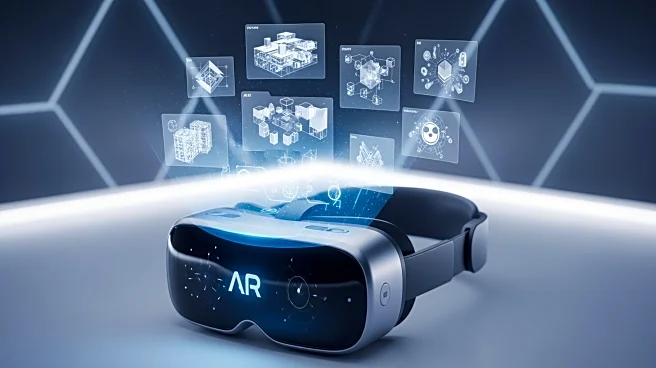What's Happening?
The augmented reality (AR) industry is experiencing significant advancements in 2025, with major brands like Meta and Amazon introducing new hardware and altering distribution and pricing strategies. Notably,
Ray-Ban Meta Gen 2 glasses have been launched with an eight-hour battery life, enhancing consumer appeal. Amazon is developing AI driver glasses aimed at improving delivery speed and safety. The market is projected to grow substantially, with IDC forecasting a 39.2% increase in AR/VR shipments compared to 2024. These developments indicate a shift from niche prototypes to mainstream consumer hardware, with products designed for everyday use and worker efficiency.
Why It's Important?
The advancements in AR technology are poised to impact both consumers and investors significantly. For consumers, the introduction of products like Ray-Ban Meta Gen 2 glasses offers practical, daily-use AR experiences, potentially changing how people interact with technology. For businesses, Amazon's AI driver glasses could streamline operations and reduce delivery errors, showcasing AR's potential in enhancing productivity. The forecasted growth in AR/VR shipments suggests increasing market demand, which could lead to more investment opportunities and technological innovations. As AR becomes more integrated into daily life, it could redefine user experiences and drive economic growth in the tech sector.
What's Next?
The AR industry is expected to see faster rollouts and increased retail availability, with a focus on worker-centric AR applications providing tangible real-world benefits. Consumers are likely to prioritize products with longer battery life and comfort, while developers may focus on dominant operating systems to maximize reach. As AR technology continues to evolve, it could disrupt daily routines and offer new ways to interact with digital content. Companies may continue to innovate, pushing the boundaries of AR capabilities and exploring new applications across various sectors.
Beyond the Headlines
The shift towards mainstream AR products raises questions about privacy and data security, as more personal data could be collected through wearable devices. Additionally, the integration of AR into everyday life may lead to cultural changes, influencing how people communicate and access information. The environmental impact of increased production and energy consumption for AR devices also warrants consideration, prompting discussions on sustainable practices within the tech industry.









